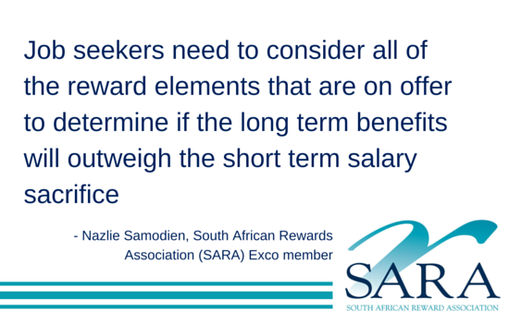 From November 2016 the South African Reward Association (SARA) will be led by Nazlie Samodien, who takes the reins as president for the 2017/2018 term of office from Lindiwe Sebesho, who ends her term on a high note. Samodien has already played a significant role in the growth and development of SARA Samodien is tasked with leading the association at an exciting time where numerous business, industry and national challenges face reward professionals – those who design remuneration structures that take into account both financial and non-financial rewards for employees on all levels. The current socio-economic environment is placing many organisations under pressure as inflation related increases are becoming less affordable, and there is a need to develop more creative ways in which to reward employees for the work they do. “Poverty and high unemployment, coupled with massive pay inequities, makes the reward space both complex and challenging,” says Samodien, a Master Reward Specialist with an impressive professional repertoire. “Executive pay and the wage gap remains an emotive issue, and effectively attracting and retaining employees remains a challenge in this context.” “Companies are also currently employing three to four generations at the same time and being flexible in their total rewards offering is important to keeping employees engaged,”adds Samodien. “The role of SARA is to promote and develop the reward profession and reward practices to equip business leaders and their reward professionals to pro-actively seek solutions to these complex matters affecting our business, society and nation as a whole.” Taking from her years of experience at Ericsson, PricewaterhouseCoopers and Edcon, Samodien is deeply committed to making a difference in the industry. Some of the changes Samodien would like to see in the South African reward space include higher levels of collaboration on reward issues between business, organised business, organised labour and other professional bodies. “One of the ways to realise this imperative is to have business understand the value of encouraging their reward professionals to earn a professional designation,” says Samodien. “A professional designation carries with it the assurance to employers and industry of demonstrated levels of experience, competency and ethical standards.” Samodien believes that well designed total reward programs and practices will result in increased investment in South African citizens, and increased opportunities for previously disadvantaged individuals. Together with her impressive professional repertoire, Samodien has an equally impressive personal list of achievements, topped by finishing the New York marathon in a respected time, despite having an iliotibial band injury. Currently planning a trip to climb Kilimanjaro with her daughter, Samodien is also looking forward to a trip to Germany to run the Berlin Marathon, and achieving her “10 in 10 consecutive years” goal by running her eighth Two Oceans Marathon in 2017. QUICK-FIRE QUIZZ
ENDS
MEDIA CONTACT: Cathlen Fourie, 082 222 9198, [email protected], www.atthatpoint.co.za For more information on SARA please visit: Website: www.sara.co.za Twitter: @SA_reward LinkedIn: South African Reward Association Facebook: SARA – South African Reward Association
0 Comments
Are you being paid what you are worth?
Take home salaries must be addressed to ensure that people earn what they are worth. Salary structures are as varied and different as the organisations that pay them. Some are structured to ensure that the employee gains significant financial rewards; others are not. “It is important for the job seeker to understand if the company is offering a basic pay and benefits or if the company is offering a total package (cost to company),” says Nazlie Samodien, South African Rewards Association (SARA) Exco member. “Take home pay can vary depending on how the company’s remuneration is structured. I’ve seen job seekers earning a basic salary of R15, 000, for example, being offered a total package of R20, 000. They are under the impression that they are being offered an increase of more than 30% without knowing that they must now pay for all the benefits from the total package that is being offered.” According to Samodien there is no rule of thumb on what to ask for on remuneration, it is dependent on the seniority of the role, the scarcity of skills that the job seeker has, the availability of variable remuneration such as commission and the level of experience that the job seeker has to offer. There are a number of considerations that the employee or job seeker needs to take into consideration before accepting a salary offer. Establish payment structure The first is to establish whether or not there is variable pay such as a commission and how the company structures the commission scheme. “I would advise that potential employees ask what the average commission payments have been with other employees in the role over the past six months,” says Samodien. “This will then put them in a better position to understand what measures are used to calculate commission and how hard or easy it will be to earn.” Consider total earnings This incorporates any other incentives provided by the business such as bonus payments or long term incentive schemes. An employee can be worse off if they don’t consider these variable pay elements over both the short and long term. “Depending on what a candidate is sacrificing in their current role they may want to negotiate this on appointment,” says Samodien. “For example, if they are eligible for a bonus with their current employer and the payment is imminent, you can negotiate an on-appointment bonus with the new company. It is also worthwhile asking the new company for a mock payslip so that it is obvious to see what will be paid into the bank account once all the deductions have been made.” “Depending on the role, the successful candidate may need to do a lot of travel and a company car or fuel card may need to be factored in,” says Samodien. “Then there is medical aid, retirement plans and income protection benefits for the employee in the event of death or disability. It is worth asking what the returns on the retirement funds have been over the past five years and what the taxes on these benefits will be.” Work/life balance In addition, it is important that the employee establish those aspects of work-life balance that they need to thrive. Many organisations offer gyms, crèches, wellness centres and more, ensuring that their staff have opportunities to unwind or look after their children. Performance incentives “Some employers have outstanding recognition programmes that are linked to performance and that can include overseas trips and these form part of the employee value proposition,” concludes Samodien. “Job seekers need to consider all of the reward elements that are on offer, especially if the pay element is not quite what was expected, to determine if the long term benefits will outweigh the short term salary sacrifice.” ENDS MEDIA CONTACT: Cathlen Fourie, 012 644 2833, [email protected], www.atthatpoint.co.za For more information on SARA please visit: Website: www.sara.co.za Twitter: @SA_reward LinkedIn: South African Reward Association Facebook: SARA – South African Reward Association |
Archives
March 2023
Welcome to the South African Reward Association newsroom.
Categories
All
|


 RSS Feed
RSS Feed